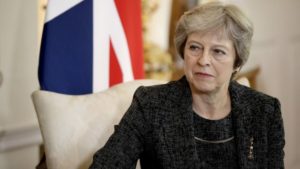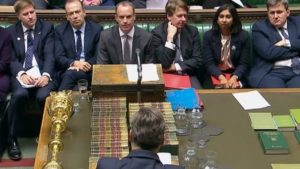
Probashbangla24 online Desk : Theresa May has urged MPs to “put the national interest first” when deciding whether to approve a Brexit deal in a crunch vote likely later this year.
Asked about the issue during Prime Minister’s Questions, Mrs May said she was working to secure the best possible agreement that respected the 2016 vote.
MPs, she said, had a duty to voters to ensure the UK left the EU in March, but in a way which protected jobs.
The EU has said “decisive progress” is needed in the coming days.
And the BBC understands that the DUP’s 10 MPs would vote down the Budget – which is at the end of October – if they think any Brexit deal breaks the party’s red line of no barriers to trade between Northern Ireland and the rest of the UK.
Mrs May has been facing the Commons for the first time since the EU rejected her Brexit plan, amid mounting pressure from some Tory MPs to change course in the run-up to a crucial meeting of EU leaders next week.
Politics Live: Prime Minister’s Questions
PM warned of ‘voter backlash’ over Brexit
Kuenssberg: How could May get Brexit deal through MPs?
She was urged by ex-Conservative chancellor Ken Clarke to seek support for her position from pro-European MPs in all parties, including Labour, if Parliament was to back any deal she negotiated with the EU.
In response, she said: “We are working for that deal. When we come back with a deal, I would hope that everybody across this whole House will put the national interest first.
“That everyone in this House will look not only at a good deal for the future of the UK but having given the decision on whether we stay in the EU to the British people, and the British people having voted to leave, it is our duty to ensure that we leave.”
Despite the UK’s imminent departure from the EU in March 2019, there is not yet a deal between the two sides on how separation will work and what their future relationship will look like.
Intense negotiations are taking place to try to reach a compromise by November – with the EU set to assess the progress made at a European Council summit next week.
As the UK steps up its preparations for the risk of a no-deal exit, the Ministry of Housing, Communities and Local Government is recruiting three “resilience advisers” to plan for and deal with any disruption to local services.
The posts on offer, according to the job ad on the gov.uk website, are “exciting and challenging opportunities for self-starters”. The individuals will initially be hired for nine months but their contracts could be extended beyond June 2019 or made permanent dependent on circumstances.
One of the major sticking points to a deal has been how to avoid new checks on the border between Northern Ireland and the Irish Republic, which will also become the future frontier between the UK and the European Union. Mrs May has been warned by Northern Ireland’s Democratic Unionist Party – whose support she relies on in key votes in Parliament – that it will not accept any solution that “divides” the UK down the Irish Sea.
At last month’s Salzburg summit, EU leaders rebuffed the PM’s plan for a free trade zone for manufactured and agricultural goods, underpinned by a common rule book, and a combined customs territory – the so-called Chequers plan.
Then, at the Conservative Party conference in Birmingham last week, rows over her strategy loomed large, with critics including former Foreign Secretary Boris Johnson urging her to “chuck” it in favour of a free trade deal like the EU has with Canada.
DUP ‘can’t talk Brexit in vacuum’
Q&A: Brexit and the Irish border
In a letter to fellow Tory MPs, Mr Davis said a deal based on Mrs May’s Chequers plan would deliver “none of the benefits of Brexit” and reduce the UK to being “a rule-taker from Brussels”.

Speaking in the Commons on Tuesday, Brexit Secretary Dominic Raab, said differences remained between the UK and EU on the withdrawal agreement but insisted “we are closing in on workable solutions”.
On the EU side, a leading MEP has said the probability of no Brexit deal has reduced slightly.
Danuta Hubner, who is on the European Parliament’s Brexit steering group, suggested the European Commission had delayed publication of advice for dealing with the consequences of a no deal exit because progress was being made in the talks.
But the International Monetary Fund (IMF) has warned that a disorderly Brexit could threaten the stability of the world economy.
The US-based organisation said a “no-deal” departure from the EU could lead to fragmentation in European money markets, meaning finance cannot flow around the system so efficiently. BBC





